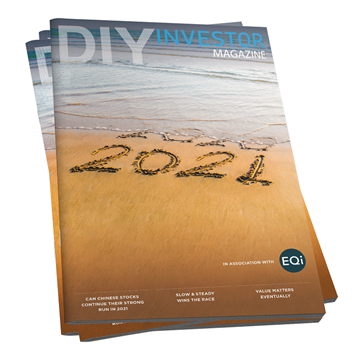Is the tide turning for UK income investing?


It’s a challenging time for investors, not least those in need of income generation. The coronavirus crisis continues to play out globally, with the UK hit worse than almost any other large economy at the start of 2021. Covid-19’s scars are likely to be with us for a long time and the path to economic recovery remains uncertain – Charles Luke, Investment Manager, Murray Income Trust PLC
However, at Murray Income Trust, we believe there are reasons for optimism on UK equities. Indeed, income investors, who may have previously overlooked the market, may want to reconsider their positions in light of some positive drivers. Let us tell you more.
Vaccines help vanquish dividend doubts
We are all familiar with the difficult dividend backdrop of the past year or so. We’ve witnessed dividend cuts, cancellations and regulatory intervention, as companies grappled with the financial impact of the pandemic.
Combined with the long shadow cast by Brexit, these headwinds were enough to turn many investors away from the UK equities market.
But the tide could be turning. The UK’s rollout of the vaccine programme has progressed extremely well, offering hope of an enduring route out of the pandemic.
At the same time, the UK equities market is significantly under-owned. For example, global and European funds’ holdings of UK equities are at their lowest for many years.
This offers potential for upside performance when these portfolios are reweighted. Valuation is another significant draw. Even if you adjust for sector differences, UK equities are more attractively valued than their US and European peers.
The hallmarks of quality
The UK equities market also benefits from an abundance of good-quality companies that are still paying attractive dividends. In nearly all cases where dividends were vulnerable to cuts, they have now been rebased.
We can, therefore, have more confidence in the UK market’s income level, with previously over-distributing companies returning to sensible pay-out ratios.
A company’s dividend is a useful touchstone for its health. From our perspective, we place great store in the simple premise; to consistently grow your dividends over the long term, you need to grow your earnings.
Good-quality companies are best placed to do just that. As income investors, it’s important to remember that dividends provide a significant part of an investment’s total return. In addition, the yield acts as a backstop for a company’s valuation.
A more optimistic outlook
In the aftermath of the pandemic, and in a world of low interest rates, high debt and pressure on corporate profits, the quality of a company will remain as important as ever. At Murray Income Trust, we believe that quality companies are more likely to be able to pay dividends even when conditions are challenging.
From here, we expect to see the following waymarks.
- Investors will pay a premium for companies capable of delivering attractive and growing dividends.
- Those companies with strong balance sheets that can undertake merger and acquisition activity, or continue to invest in their businesses through the cycle should emerge in a stronger competitive position.
- Structural long-term earnings potential in a world of modest medium-term growth will continue to be prized.
- Therefore, companies with sustainable competitive advantages and pricing power should benefit disproportionately.
Final thoughts …
As we’ve highlighted, there are several positive drivers at play in the UK equities market. For income investors who may have disregarded it, we believe now could be a good time to reconsider investing in the UK.
At a time when quality counts, we maintain our disciplined and measured focus on financially strong, resilient companies that can thrive whatever the conditions. These businesses offer the potential to grow their earnings, and hence their dividends, over the long term.
Important information
- Risk factors you should consider prior to investing:
- The value of investments and the income from them can fall and investors may get back less than the amount invested.
- Past performance is not a guide to future results.
- Investment in the Company may not be appropriate for investors who plan to withdraw their money within 5 years.
- The Company may borrow to finance further investment (gearing). The use of gearing is likely to lead to volatility in the Net Asset Value (NAV) meaning that any movement in the value of the company’s assets will result in a magnified movement in the NAV.
- The Company may accumulate investment positions which represent more than normal trading volumes which may make it difficult to realise investments and may lead to volatility in the market price of the Company’s shares.
- The Company may charge expenses to capital which may erode the capital value of the investment.
- Derivatives may be used, subject to restrictions set out for the Company, in order to manage risk and generate income. The market in derivatives can be volatile and there is a higher than average risk of loss.
- There is no guarantee that the market price of the Company’s shares will fully reflect their underlying Net Asset Value.
- As with all stock exchange investments the value of the Company’s shares purchased will immediately fall by the difference between the buying and selling prices, the bid-offer spread. If trading volumes fall, the bid-offer spread can widen.
- Certain trusts may seek to invest in higher yielding securities such as bonds, which are subject to credit risk, market price risk and interest rate risk. Unlike income from a single bond, the level of income from an investment trust is not fixed and may fluctuate.
- Yields are estimated figures and may fluctuate, there are no guarantees that future dividends will match or exceed historic dividends and certain investors may be subject to further tax on dividends.
Other important information:
Issued by Aberdeen Asset Managers Limited which is authorised and regulated by the Financial Conduct Authority in the United Kingdom. Registered Office: 10 Queen’s Terrace, Aberdeen AB10 1XL. Registered in Scotland No. 108419. An investment trust should be considered only as part of a balanced portfolio. Under no circumstances should this information be considered as an offer or solicitation to deal in investments.
Investors should review the relevant Key Information Document (KID) and brochure prior to making an investment decision. These can be obtained free of charge from www.invtrusts.co.uk or by writing to Aberdeen Fund Managers Limited, PO Box 9029, Chelmsford, CM99 2WJ.
FTSE International Limited (‘FTSE’) © FTSE 2019. ‘FTSE®’ is a trade mark of the London Stock Exchange Group companies and is used by FTSE International Limited under licence. RAFI® is a registered trademark of Research Affiliates, LLC. All rights in the FTSE indices and/or FTSE ratings vest in FTSE and/or its licensors. Neither FTSE nor its licensors accept any liability for any errors or omissions in the FTSE indices and/or FTSE ratings or underlying data. No further distribution of FTSE Data is permitted without FTSE’s express written consent.
Find out more at www.murray-income.co.uk or by registering for updates.
You can also follow us on Twitter and LinkedIn.
Click to visit:
Read the latest edition of DIY Investor Magazine
DIY Investor Magazine
The views and opinions expressed by the author, DIY Investor Magazine or associated third parties may not necessarily represent views expressed or reflected by EQi.
The content in DIY Investor Magazine is non-partisan and we receive no commissions or incentives from anything featured in the magazine.
The value of investments can fall as well as rise and any income from them is not guaranteed and you may get back less than you invested. Past performance is not a guide to future performance.
DIY Investor Magazine delivers education and information, it does not offer advice. Copyright© DIY Investor (2016) Ltd, Registered in England and Wales. No. 9978366 Registered office: Mill Barn, Mill Lane, Chiddingstone, Kent TN8 7AA.

